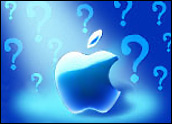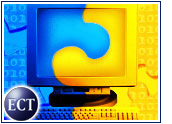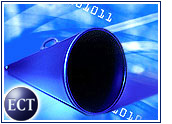
Apple has made it a priority to lure small businesses to the Mac OS platform, reasoning that those businesses will be willing to abandon Windows in favor of a network that is easier to maintain without tremendous IT resources.
Granted, adopting an Apple solution is more costly initially, Al Gillen, director of infrastructure software research at IDC, told the E-Commerce Times. “Apple typically charges a premium because they feel customers are getting better technology,” he noted.
But in the long run, higher up-front costs may be offset by lower networkmaintenance costs, particularly for a small business. After all, Appleis known for producing systems that require very little support and that are intuitive enough for even novice users to maintain.
Enterprise in Sight
Apple director of product marketing for consumer applications Peter Lowe confirmed to the E-Commerce Times that Apple is aiming many of its products and initiatives squarely at the enterprise. And Brian Croll, Apple’s senior director of software for worldwide product marketing, told the E-Commerce Times that the company is confident it can score in that arena.
Toward that goal, Apple has in the last six months introduced the Xserve rack mount server, shipped the Jaguar operating system, made it easier for companies to set up networked printers, eased the process of synching desktops with wireless devices, and directly challenged Microsoft’s .NET Web services platform with its own .Mac offering.
The company also is likely to throw its hat into the 64-bit chip arena. Such a move would make sense, Aberdeen Group director of semiconductors Russ Craig told the E-Commerce Times, particularly for Apple’s user base in the publishing industry. “Having the 64-bit architecture might well speed up some of those graphic applications, which are extremely computing-intensive,” he said.
Busy Year
Despite Apple’s solid moves into the corporate environment, however, the company still must convince buyers that it can play hardball in the enterprise and be a formidable challenger to other proven operating systems, including Windows.
Apple has made some positive steps in that direction. Jaguar — version 10.2 of OS X — has flown off shelves, and the company’s relationship with Microsoft, albeit tenuous, has ensured greater interoperability between the two platforms, making it easier for companies to switch operating systems without losing their existing investment in applications.
Indeed, the company’s strategy has been to create a streamlined software environment that is easy not only for users, but also for developers. For instance, the Xserve hardware configuration is spelled out, leaving little or no room for hardware problems to arise.
The machine features dual 1 GHz PowerPC G4 processors, each with 2 MB of double data rate (DDR) L3 cache, and it is the first 1U server to use DDR SDRAM memory with up to 2 GB capacity. It also offers best-in-class storage, with up to 480 GB on four hot-pluggable ATA/100 hard drives, as well as best-in-class networking with standard dual Gigabit Ethernet ports.
Another big plus is that instead of being priced at a per-user fee, the Xserve comes with an unlimited client license.
High Marks
Apple has drawn high marks from analysts like the Yankee Group’s Laura Didio, who recently told the E-Commerce Times that the company achievedtrue innovation with its Jaguar operating system.
What is more, the company’s Rendezvous offering helps devices that have IP (Internet Protocol) addresses recognize each other and create instant networks. Rendezvous supports Ethernet, AirPort 802.11, Bluetooth, Firewire and USB (universal serial bus) standards, and it uses IP for transmission. It will also take the sting out of networking printers, because it requires no configuration at all.
Users Fed Up
There is some indication that Apple has an opportunity to steal some of Microsoft’s thunder by gaining ground in the small business marketplace. Microsoft has turned off a lot of companies with its strong-arm techniques, inflexibility and befuddling and costly licensing structure.
Microsoft’s new licensing structure calls for businesses to pay regular installments in exchange for the ability to upgrade applications at any given time, versus the traditional one-time flat fee with optional upgrades after that.
The plan boosts the overall price for many companies and has upset some Microsoft customers. An IDC survey found that as many as 38 percent of respondents had investigated alternatives to Windows, including Linux and Mac.
“What customers have told me is that they’re looking at alternatives,” Gillen said. But virtually no one, he added, feels there is currently a viable alternative to the Windows desktop for their infrastructure.
It is up to Apple to convince them otherwise.













































I dunno if this article is on track. My own experience with OS X suggests the opposite conclusion. I was hired by a small outfit to setup some e-commerce software on a system located 500 miles from my location. I found that all the system admin and configuration procedures assumed you were running with a local system with an X-windows interface. The alternative was to go edit the configuration files that Apple had tweaked so much so that it was kinda scary. Most small businesses owners need to focus on their business and don’t wanna mess with "geeky stuff" at all. So they hire people with specific "domain expertice" to do the needed tasks. My initial impression is that Apple may not understand how small businesses actually operate. Do they expect that folks like lawyers and accountants are gonna spend their most critical resource, their own time, on learning how to administer the hardware and the network themselves? What’s wrong with this picture? I just dunno. Although we don’t wanna rule out brain damage on my part, I’m not exactly a rookie at this sort of thing. I’ve been a unix system admin since the Sun-2 and have worked with every flavor of unix from all the major vendors and most of the off-the-wall ones since 1985. Now maybe I’m way off base and my own vested interests blind me to Apple’s brilliant strategy that allows all small business folks to become their own unix system admins…
.
best regards,
.
buck
I think it would be stupid for small business not to had apple.
"Yankee Group’s Laura Didio, who recently told the E-Commerce Times that the company achieved true innovation with its Jaguar operating system."
My last comments never got posted so I will try to be kinder. Why does Laura Didio, a stalwart champion of the obvious, get quoted so often? Her qualifications are "12 years covering the networking industry as a reporter in the high-tech trade press," where apparently, she failed to learn anything except unctuous self promotion. I suppose, if she had covered F1 racing for 12 years, she would be qualified to help Michael Schumacher select his next racing car.
Apple has a long way to go before it can be a business leader, and their professed "humble" attitude towards the enterprise is very deserved. That being said, there are some narrow, non-traditional areas where Apple is actually the price leader as well as having good technology.
For new companies setting up for the first time or new offices opening up for established, the lack of Client Access Licenses means you can get by with less money than a Windows solution would charge and without the burden of the tech support salary that’s necessary if you choose Linux. Score one for Apple.
Another good selling point for Apple is their commitment to interoperability. Their fileserver solution happily works with Windows, Unix, or traditional Apple networks without any add-ons. Their directory server interoperates with Active Directory, NDS, NIS+, and works through industry standard LDAPv3 which means that if Apple ever goes down the path to irrelevance, users won’t be stranded but will easily transit to a different vendor.
Mac OS X has really cut the heart out of Microsoft’s anti-Unix push, both on purchase cost and on ease of administration arguments. As more and more Unix shops take an honest look at their alternatives, Apple’s likely to have a surge in new areas they’ve never been before.
Here’s hoping they don’t blow it.